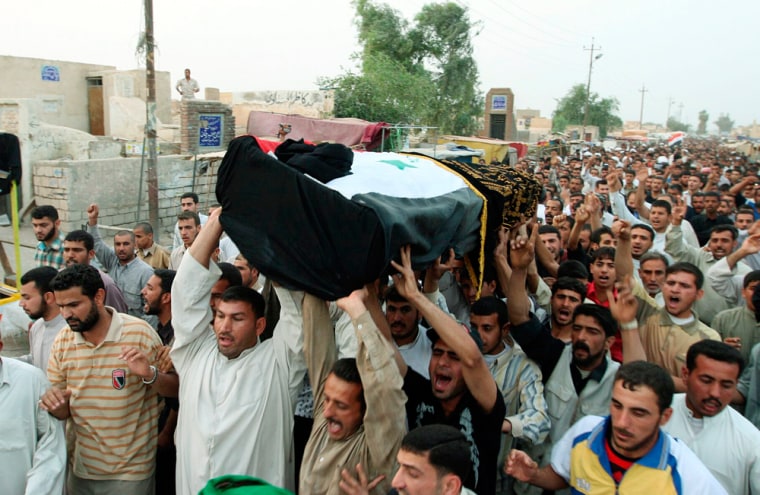Differences have emerged between the U.S. and Iraq on how to deal with Shiite militant Muqtada al-Sadr, with the Americans appearing more willing than the Shiite-led government to concede a legitimate political role to the anti-U.S. cleric.
The gap appeared after fighting broke out last month between Iraqi forces and al-Sadr's Mahdi Army militia in Basra. Clashes quickly spread to Baghdad, where U.S. and Iraqi troops are still confronting Shiite militiamen in the Mahdi Army stronghold of Sadr City.
Throughout the fighting, U.S. commanders have avoided publicly identifying al-Sadr or his Mahdi Army as their adversary, instead referring to the Shiite militants as "special groups" or simply "criminals."
Moreover, top American officials have left the door open for al-Sadr, who is believed to be in Iran, to maintain a significant role in Iraqi politics.
Last week, U.S. Defense Secretary Robert Gates described al-Sadr as "a significant political figure," adding that the Americans wanted to see him "work within the political process."
The top U.S. commander in Iraq, Gen. David Petraeus, went even further, telling reporters that al-Sadr's political movement was a major force that should be "to varying degrees, accommodated."
Those comments were measured, and the Americans were clear that al-Sadr's participation in politics should be conditional on abandoning militia violence.
Still, the comments worried close aides of Prime Minister Nouri al-Maliki, who feared the U.S. remarks might encourage al-Sadr to resist Iraqi government demands to disband his militia. The aides spoke on condition of anonymity because the issue is sensitive.
While the Americans were speaking of a possible role for al-Sadr, al-Maliki was lining up political support among Shiite, Sunni and Kurdish parties for a major showdown with the cleric — aimed at eliminating the Sadrists as a political force in the Shiite heartland of southern Iraq.
Al-Maliki, himself a Shiite, said publicly this month that al-Sadr must disband the Mahdi Army or get out of politics.
A major shift
The prime minister is asking parliament to approve legislation that would bar any party from fielding candidates in provincial elections this fall if it maintains a militia.
Al-Maliki's measure was clearly aimed at al-Sadr, even though most Iraqi parties maintain ties to armed groups. Many of these militias have been absorbed into the army or police while still keeping links to their political sponsors.
Such a hard-line stance against al-Sadr represents a major shift for al-Maliki, whose Dawa party politically rehabilitated the Sadrists in 2005 after they staged two uprisings against U.S.-led forces the year before.
The Dawa party moves ensured al-Sadr a major role in Iraqi politics and prevented any legal actions against him.
Later, al-Maliki criticized U.S. military strikes in Sadr City and prevented American forces from moving deep into the sprawling Shiite slum.
All that began to change last year when al-Sadr withdrew his supporters from al-Maliki's government over the prime minister's refusal to demand a timetable for a U.S. troop withdrawal from Iraq.
In the meantime, al-Maliki and his Shiite allies in the Supreme Islamic Iraqi Council have become concerned at the prospect that al-Sadr's followers will win a significant share of power in the fall provincial elections.
A considerable following
Such an outcome would be a severe blow to the two main Shiite parties in government since it could establish al-Sadr as the major force in the south — a region rich in oil and prestigious religious sites that attract millions of Shiite pilgrims.
The Americans are also aware of al-Sadr's considerable following among impoverished Shiites in the south. But U.S. officials fear that pushing him into a corner would trigger further violence at a time the Bush administration wants to highlight progress toward a stable Iraq.
With few troops in the south, the Americans lack the muscle there that they have in central, western and northern Iraq. The British have only about 4,000 troops in the south, compared with 155,000 American troops nationwide.
And the Iraqi military's disappointing performance in the recent Basra crackdown — during which 1,300 soldiers and police refused to fight — raises doubts whether the Iraqis could handle an all-out war without U.S. help.
